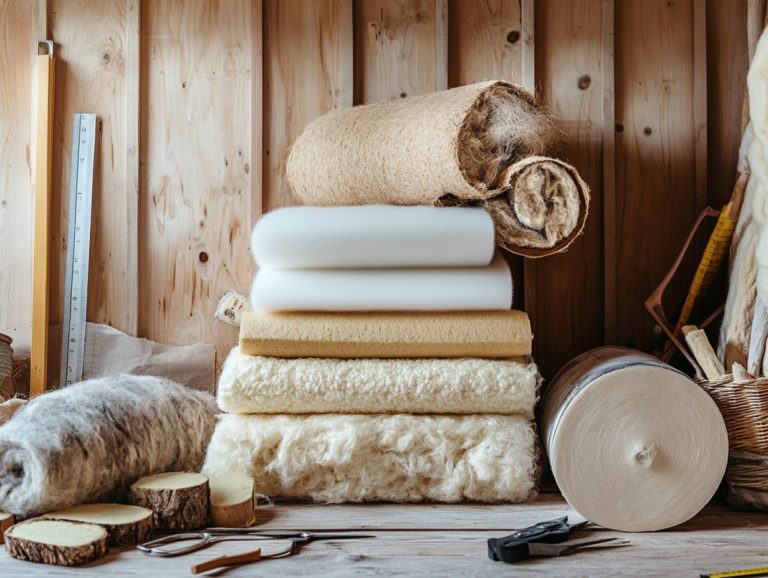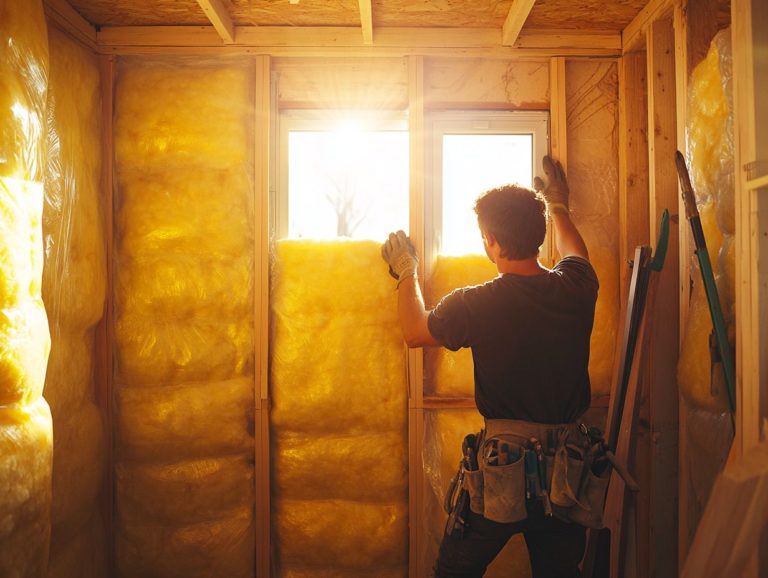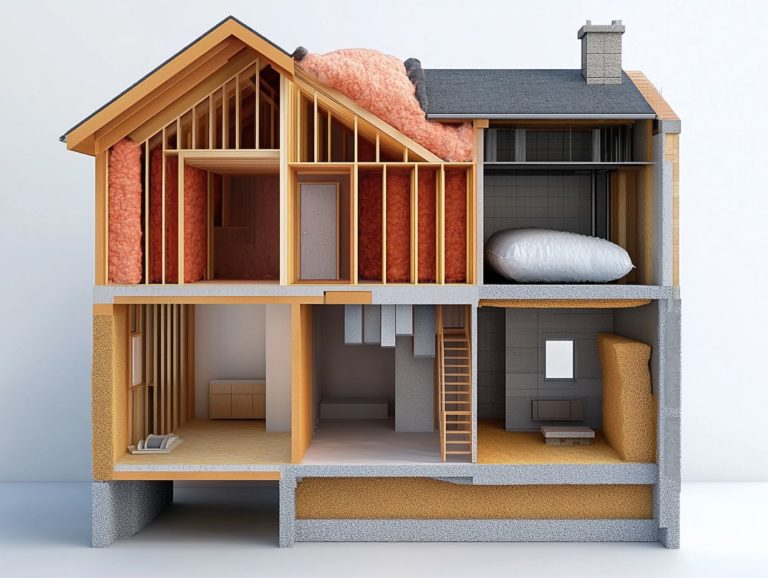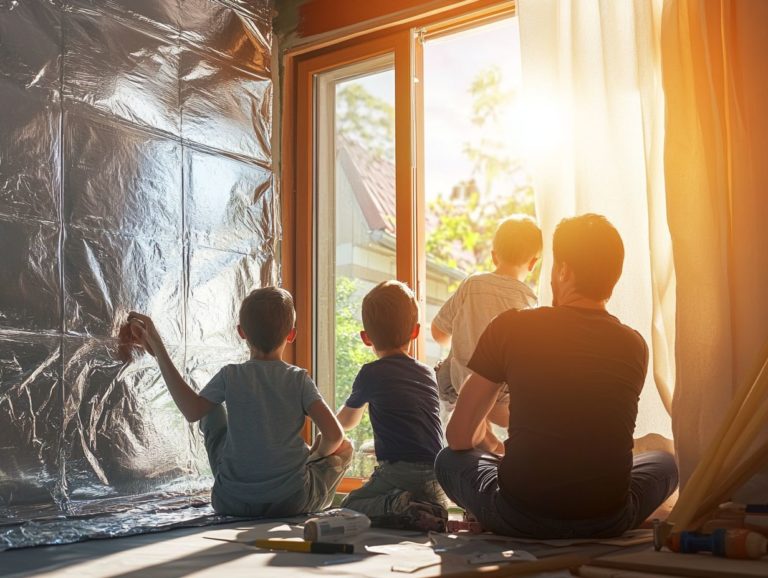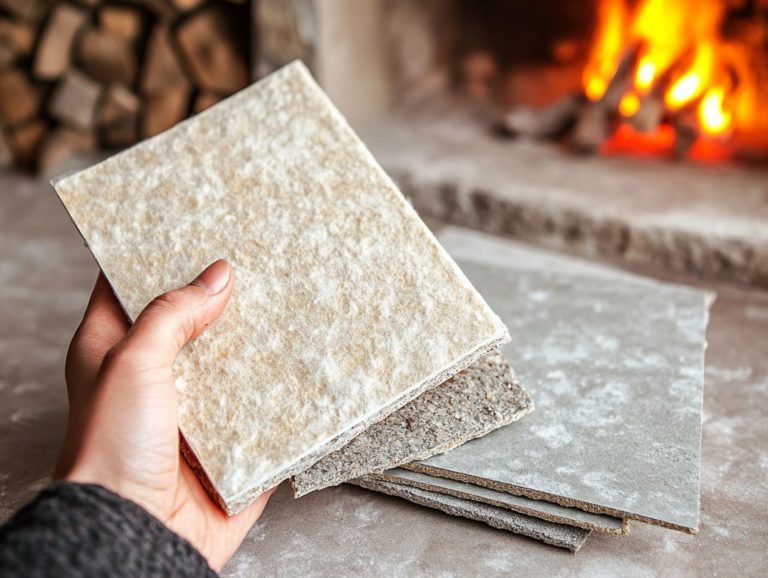Why Insulation is Key for Home Comfort
Home insulation is essential for crafting a comfortable living space and optimizing energy efficiency. Understanding the basics of insulation, including its diverse types and benefits, empowers homeowners like you to make well-informed choices.
This guide delves into crucial elements of home insulation, from enhancing temperature control to factoring in climate and budget.
Whether you aim to upgrade your existing setup or simply expand your knowledge, the insights provided here will help you create a cozier, more sustainable home.
Contents
- Key Takeaways:
- Understanding Home Insulation
- Benefits of Proper Home Insulation
- Common Types of Home Insulation
- Factors to Consider when Choosing Insulation
- Insulation Installation and Maintenance
- Frequently Asked Questions
- What is insulation and why is it important for home comfort?
- How does insulation help regulate temperature in a home?
- Can insulation really save me money on my energy bills?
- What types of insulation are available for homes?
- What are the benefits of good insulation for indoor air quality?
- How can I tell if my home needs more insulation?
Key Takeaways:

- Good insulation can transform your home into an energy-saving haven!
- Proper insulation cuts energy costs and reduces your carbon footprint.
- Choose insulation based on climate, building structure, budget, and sustainability for maximum effectiveness.
Understanding Home Insulation
Understanding home insulation is essential for enhancing the comfort of your living spaces. Proper insulation acts as an insulation layer, effectively reducing heat transfer during both winter and summer.
It minimizes air leaks, which can lead to higher utility costs and less comfort. By upgrading your insulation, you can create a more controlled indoor environment while cutting down on energy consumption.
This leads to significant savings on your utility bills. Insulation also helps reduce noise and keeps pests away, creating a healthier home.
What is Home Insulation?
Home insulation is an essential aspect of your living space, designed to minimize heat transfer, maintain a consistent indoor temperature, and enhance energy efficiency.
By sealing your environment effectively, it helps reduce air leaks that can lead to higher energy bills and a less comfortable atmosphere.
You ll find a variety of insulation materials at your disposal, such as:
- Cellulose, made from recycled paper products
- Spray foam, which expands upon application to fill gaps and create an airtight seal
Each type serves a specific purpose, providing thermal resistance and soundproofing advantages. The importance of proper insulation cannot be overstated; it boosts comfort and plays a crucial role in lowering your carbon footprint while achieving energy savings.
Benefits of Proper Home Insulation
Investing in proper home insulation brings a wealth of advantages beyond comfort. You’ll see improved energy efficiency, which enhances your living experience and leads to savings on utility bills.
Investing in insulation makes sense for homeowners looking to improve both their home and financial well-being.
Improved Energy Efficiency
One of the most significant advantages of proper insulation is its remarkable energy efficiency, translating into reduced utility costs and substantial savings.
With an effective insulation system, your home can maintain a consistent indoor temperature, minimizing the need for excessive heating or cooling. This stability leads to decreased energy consumption; studies reveal that well-insulated homes can save you up to 20% on heating and cooling bills annually.
When combined with energy-efficient windows and doors, along with regular HVAC maintenance, your home’s performance improves exponentially. This synergy enhances comfort and promotes environmentally friendly living, helping to lower your overall carbon footprint.
Enhanced Comfort and Temperature Control

Enhanced comfort and temperature control are yours to enjoy with proper home insulation. This allows you to maintain a consistent climate throughout the year.
This effective barrier retains your desired indoor temperature, minimizing those pesky fluctuations between cold and hot spots that can disrupt the ambiance of your home.
When insulation is installed correctly, it ensures that the warmth generated by your heating systems or the cool air from your air conditioning is evenly distributed.
This creates a more pleasant living environment.
As a result, you ll find yourself relying less on HVAC systems, meaning reduced energy consumption and lower utility bills.
By stabilizing indoor temperatures, insulation enhances overall air quality, contributing to a healthier atmosphere and promoting your well-being.
Common Types of Home Insulation
Grasping the various types of home insulation is crucial for making informed choices about the materials and methods that will best cater to your specific requirements.
Comparing Materials and Applications
When evaluating insulation materials, you must consider essential factors like R-value (a measure of insulation’s effectiveness), cost, and the best uses for each type.
Every insulation material possesses distinct characteristics that influence its effectiveness in various environments.
- For instance, fiberglass insulation enjoys widespread popularity because it s affordable and effective, making it an excellent choice for attics where heat retention is critical.
- Spray foam insulation, though pricier, offers exceptional air sealing capabilities and is great for crawl spaces and basements where moisture control is vital.
- Cellulose insulation stands out for its eco-friendliness and soundproofing qualities, often being utilized in wall cavities to enhance thermal performance.
By carefully weighing these factors, you can make informed decisions that align perfectly with your specific needs.
Factors to Consider when Choosing Insulation
When selecting the right insulation, you’ll want to consider several critical factors: climate, building structure, budget, and sustainability.
Each of these elements plays a significant role in both the performance and cost-effectiveness of your insulation choice.
Take the time to evaluate these aspects carefully, as they will directly influence the efficiency and overall value of your investment.
Climate and Building Structure
The local climate and building structure are crucial in determining the most effective insulation solutions for your home.
Every region presents its own set of challenges: the intense humidity of coastal areas, the parched heat typical of arid zones, or the biting cold found in northern climates.
To ensure your home remains a comfortable sanctuary, effective insulation must be tailored to these specific conditions.
This approach dramatically boosts thermal comfort and prevents mold growth don t miss out on a healthier home!
The architecture of your home also plays a significant role in dictating the type of insulation materials suitable for walls, roofs, and floors.
For instance, a home with a flat roof may necessitate different insulation solutions compared to one with traditional sloped roofing.
By aligning your insulation strategies with both climate and structure, you can achieve impressive energy efficiency and enjoy substantial long-term savings.
Budget and Sustainability
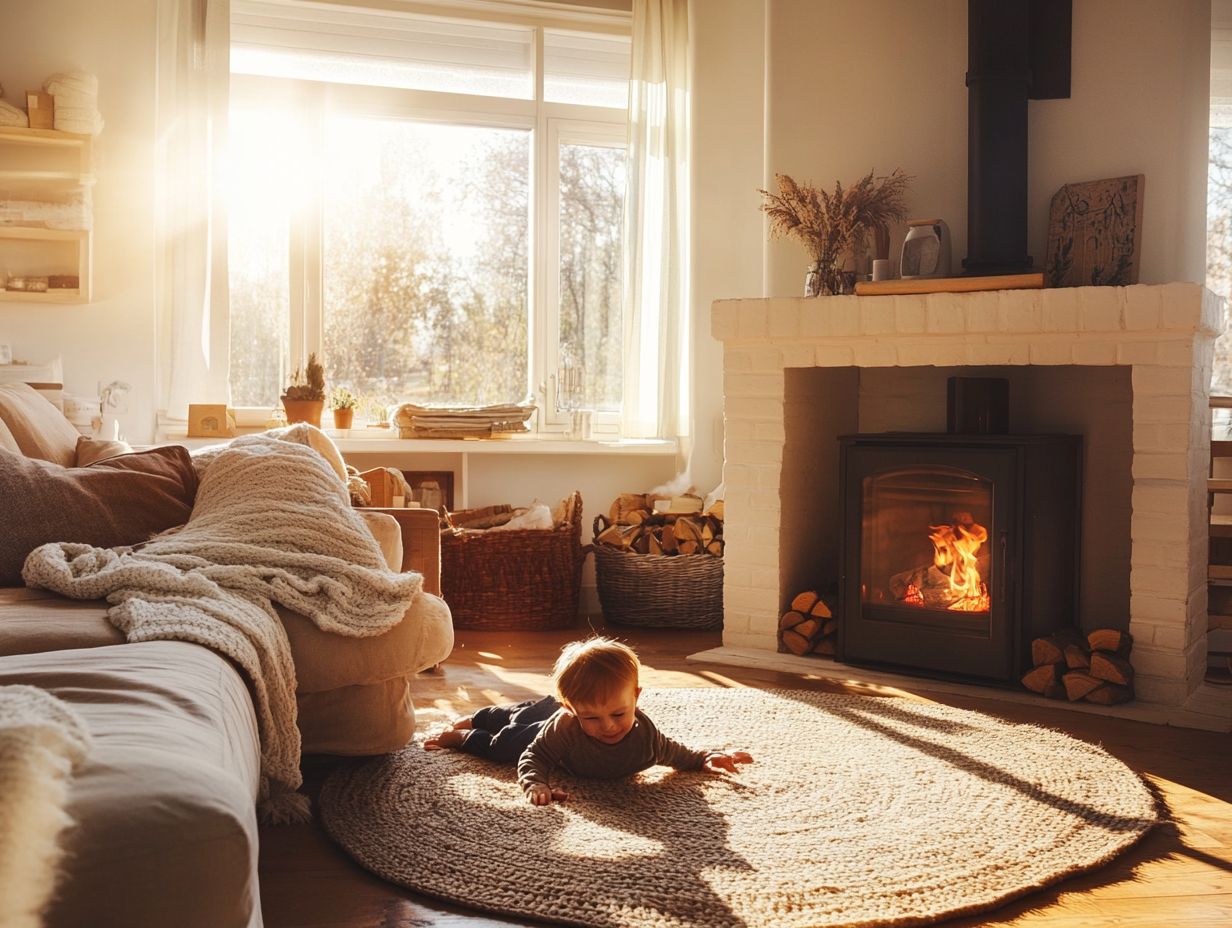
When selecting insulation materials, budget constraints and sustainability goals are paramount. It s essential for you to strike the right balance between cost and environmental impact.
In today s housing market, where energy efficiency reigns supreme, understanding how your budget limitations influence insulation choices is critical.
You likely want materials that align with your financial plans while also delivering long-term savings on energy bills.
For instance, options like cellulose and fiberglass insulation tend to be more affordable and come with a smaller environmental footprint.
These materials not only provide effective thermal resistance but also help you reduce heating and cooling costs over time.
Opting for such sustainable choices can enhance both your comfort and efficiency, demonstrating that financial sensibility and ecological responsibility can truly go hand in hand.
Insulation Installation and Maintenance
Ensuring proper installation and maintenance of insulation is essential for maximizing its effectiveness in enhancing energy efficiency and comfort within your home.
Proper Techniques and Maintenance Tips
Using the right installation techniques and maintenance tips can greatly enhance the energy efficiency of your home insulation. A methodical approach not only helps reduce your energy bills but also creates a more comfortable living environment.
When you install insulation, ensure that it fits snugly in all areas, like attic spaces and wall cavities. This means measuring precisely and cutting the material to fit without any gaps.
Regularly checking for air leaks around windows, doors, and electrical outlets is essential; these leaks can lead to significant heat loss. Check your insulation every few years to spot wear and tear, enabling timely repairs or upgrades.
Don t wait! Regularly inspect your insulation to keep your home energy-efficient.
Frequently Asked Questions
What is insulation and why is it important for home comfort?
Insulation is a material that keeps your home warm in winter and cool in summer. It is important for home comfort because it helps regulate temperature, reduces energy costs, and improves indoor air quality.
How does insulation help regulate temperature in a home?

Insulation acts as a barrier to heat flow, preventing warm air from escaping in the winter and keeping cool air inside during the summer. This helps maintain a consistent and comfortable temperature in your home all year round.
Can insulation really save me money on my energy bills?
Yes, insulation can help you save money on your energy bills. By reducing the amount of energy needed to heat or cool your home, insulation can lead to significant cost savings over time. In fact, did you know? Proper insulation can cut your energy costs significantly! According to the EPA, homeowners can save an average of 15% on heating and cooling costs by properly insulating their homes.
What types of insulation are available for homes?
There are several types of insulation available, including:
- Fiberglass
- Cellulose
- Spray foam
- Rigid foam
Each type has its own benefits and is suitable for different areas of a home. It is best to consult with a professional to determine the best type of insulation for your specific needs.
What are the benefits of good insulation for indoor air quality?
Good insulation can improve indoor air quality by preventing air pollutants and allergens from entering your home. It also helps seal any gaps or cracks where outside air could enter, reducing the amount of outdoor pollutants that can affect the air inside your home.
How can I tell if my home needs more insulation?
There are a few signs that your home may need more insulation, including:
- High energy bills
- Uneven temperatures throughout the house
- Drafts or cold spots
It is also important to have your insulation checked periodically to ensure it is still performing effectively.

